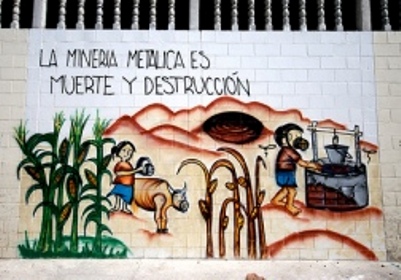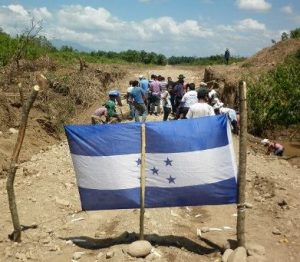Advocacy, Get Involved
They Aren’t Old Ghosts: The Roundtable Against Mining on Obama’s Visit
By the Communications Team of the National Roundtable against Metallic Mining
In the context of President Barack Obama’s visit to Salvadoran lands, congressional representatives of the United States sent a communiqué to the mandatory in which they expressed several important demands related to the country’s current socio-political situation.
The representatives urged the U.S. president to review the terms of the Free Trade Agreement (CAFTA), to annul the rights of transnational corporations to undermine the sovereign rights of other countries, and a more solidarity-minded and responsible accompaniment to the misfortune lived by the communities in resistance to the projects of transnational corporations that are crashing onto Salvadoran soil.
The aforementioned communiqué appeared in some national newspapers (here), which can be considered of great importance because it represents a necessary and opportune counterweight to the official agenda that was realized by the mainstream media during President Obama’s visit.
The text uses key arguments to reflect the disadvantages inherent in the asymmetrical trade agreements imposed by the United States. And in doing so, the discontent demonstrated by hundreds and thousands of people in different points of the capital of El Salvador the day before and during Obama’s visit, is seen backed and supported in the position of the U.S. politicians that signed the document.
The demonstrations in San Salvador organized for the arrival of the U.S. mandatory are not, as has been implied by certain simplistic analysists: old ghosts of a propagandist opposition, an outdated discourse or archaic mechanisms for political action. The protests for the right to self-determination and respect of national sovereignty, for the end to military occupations in multiple countries of the world, for freedom for political prisoners, for the end to support of coup regimes, etc., have an undeniable current relevance.
While it may be true that the themes of the social demands are not new, the reality has required the blunt revelation to the population that we are dealing with the same political and economic monsters. The very political and economic principals that abound are echoing the old and terrible forms of understanding development and the wellbeing of the people. The support given to Porfirio Lobo’s arrival to power in Honduras and the decisive role played by the United States in the military offensive against Libya are clear demonstrations that U.S. foreign policy has not substantially changed in spite of the passage of time and in spite of the discontent that is making itself heard in all parts of the world, including from within the very North American country. They aren’t, therefore, old ghosts that we are seeing.
As the National Roundtable against Metallic Mining, we thank the solidarity and accompaniment of the congressional representatives that signed the communiqué published the 23rd of March and we praise their conviction to support El Salvador and other countries that are harmed by the foreign policy of the United States.
Likewise, we are filled with enthusiasm by the determined support of international solidarity organizations located in various parts of the United States that have succeeded in positioning the demands of the social and anti-mining movement of El Salvador in the Congress of their own country. The congressional work supported by the Committee in Solidarity with the People of El Salvador (CISPES), U.S. El Salvador Sister Cities, and the Sierra Club and the financial support given by many other organizations to publish such an important and supported communiqué are demonstrations of the support that pushes us to decidedly continue forward.
Click here to see the published communiqueé
The paid ad was published thanks to solidarity organizations like:
SHARE Foundation
CODESES, Committee to Support Social Development in El Salvador;
U.S. El Salvador Sister Cities;
CISPES, Committee in Solidarity with the People of El Salvador;
IPS, Institute for Policy Studies’
Sisters of Mercy of the Americas-Institute Justice Team;
SOA Watch-San Francisco;
Food and Water Watch ;
Public Citizen;
WOLA, Washington Office on Latin America;
MOFGA-ESSC, Maine Organic Farmers and Gardeners Association-El Salvador Sister Cities Committee;
Mining Watch Canada.



